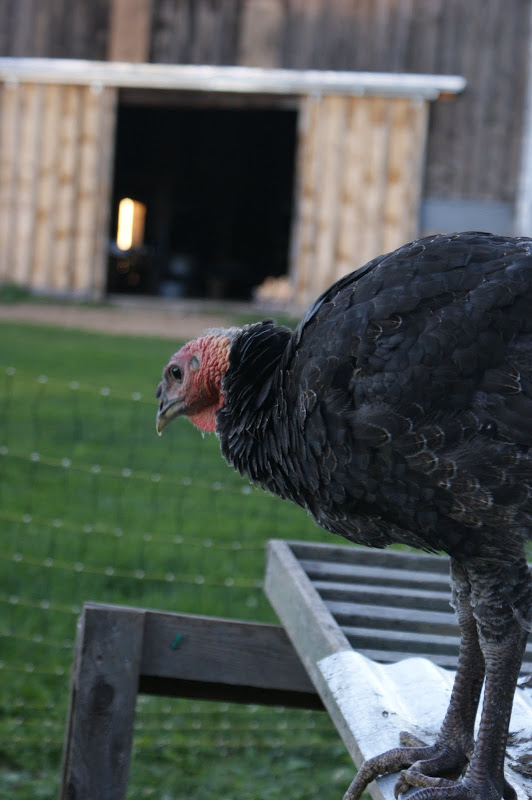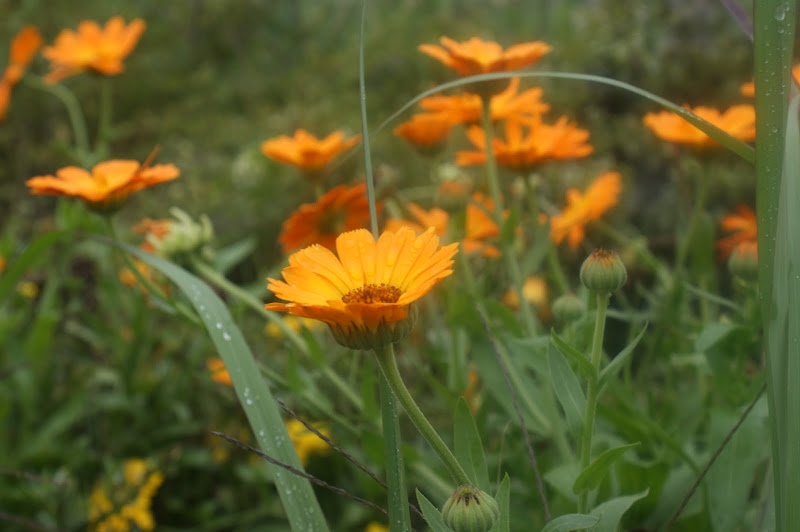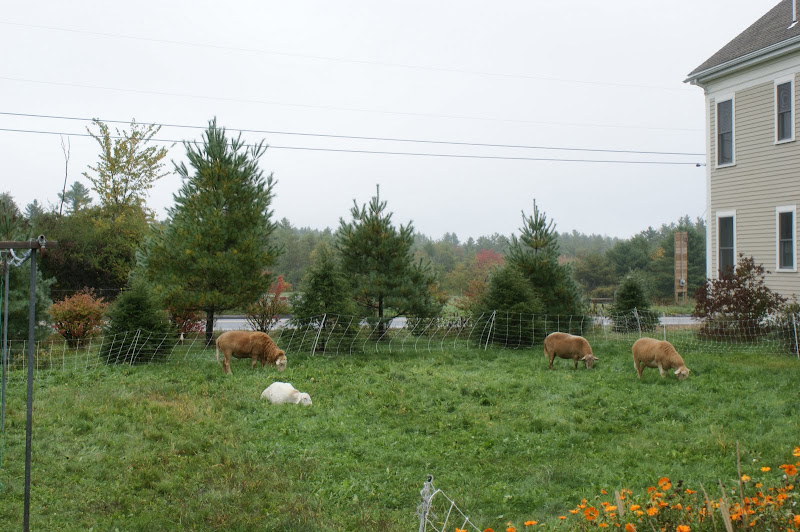

Lettuce
Jarahdale squash
Buttercup squash (John's favorite)
Chard
Onions
Potatoes
Carrots
Tomatillos
Cabbage
Golden Beets
Herbs -- Cilantro or Dill
Radishes
The arrival of fall marks the onset of the real value of your CSA share. We like to compare the value of the share to obtaining the same amount of produce from a Farmer's Market each year. What we consistently see each year is that by the middle to the end of September, the $500 value has been realized, making all the bounty after that bonus savings for your wallet. In addition, the types of products you are taking home this time of the season can almost all be stored for later use, with the exception of the greens. Onions will store in a cool, dry place. Carrots and potatoes like a cool, dark spot that has some moderate humidity-- an unheated cellar is perfect (but that is not as common these days with central heating furnaces. ) Squash prefers a cool, dark spot as well, but can better with less humidity-- we use our coat room, or a closet. Storing produce will be best achieved with good quality pieces that don't have any blemishes. If you happen to find yourself with a blemish spot on a piece of squash, watch it closely and don't store with the other pieces. One bad apple can spoil the bunch! You can still eat this piece, just plan to do it sooner that the others.
Beets are also good to store, but this week's beets are young and tender and... not red! They are golden beets so they would be perfect to serve the members in your family who don't eat beets. Disguised as they are, slip them into a nice side dish with cheese (beets go great with cheese)... Perhaps something like this Epicurious recipe using feta, but any cheese does well. If you are a beet lover, these small beets would be good grated raw. And don't forget to use the greens if you are a beet green fan. Come to think of it Beets could just be the most versatile vegetable in the garden! When it is young, eat it grated raw; when it is medium sized, eat it sauteed or roasted; when it is gigantic, boil it, bake it, or make borscht!
One thing we would like more of is cabbage and broccoli this fall. The unusually hot weather this summer made those crops really suffer from lack of water, high temperatures, and the tremendous pest pressure. Our Brussels sprouts, which usually do not need protection from flea beetles, got hammered by bugs and do not look like they will get big enough to harvest. Relished by some, including us, Brussels sprouts may not be a miss for others. We do have lots of other delicious, fresh greens coming your way this fall, including another flush of spinach.

A quick look at the 10 day forecast suggests at least another week until the chance for the first frost descends on us. Although this makes farming and harvesting easier, we also look forward to this marker of time to remind us that a little rest time is ahead. This also means that the flower garden still has some blooms for you to enjoy. Please take advantage of the garden's glory and help yourself to a bouquet when you come to pick up your share. Or, stop by this week at your convenience.

In addition to the value of flowers and storage vegetables, consider cutting lots of sage, thyme, oregano and mint to dry for your winter cooking. In addition to the herbs, calendula flower are making a second showing

and dried, they make a delicious addition to a tea mix. All of the herbs and edible flowers are growing along the side of the barn near the greenhouse.

The chickens are enjoying a feast of sunflowers seeds all over the farm as the flower heads dry and drop their progeny. Please feel free to cut a head or two for the birds at your home or to dry and save for planting in your garden next spring.

(Doesn't this foggy morning photo remind you of those Glamour Shots available at the mall in the 80's and 90's?) (I only realized this still existed after Googling Glamour Shots for a link of some sort...who would of known such a business could continue...?)
Every year as we approach the end of the growing season, John and I make our "Winter Agenda" complete with numbered priorities. Looking back on old lists is both a source of pride and a sense of momentary lapse of realism. As with any 'to-do' list, certain projects appear for numerous years/seasons. Sometimes, a job feels so big and new and onerous, we are handicapped at where, when and how to tackle it. With some projects, one of us takes a natural lead, pushing the work ahead. With other projects, neither of us can muster the courage to engage it. For years, we have been wanting to have permanent fencing for our livestock. All the way back when we started Turkey Hill Farm in Cape Elizabeth, we wanted permanent, perimeter fencing to provide a greater guarantee that we would not have livestock on the loose. When we moved to Broadturn Farm in the fall of 2006, we started the process of working with our local NRCS office on a cost share program for fencing. By 2008, we had been awarded a fencing cost share. We planned, puttered, pounded and pondered this project until finally deciding to bring in a fencing contractor to help us move forward. Thanks to Ben Hartwell, from Sebago Lake Ranch, a grass-fed beef farm, we now have a new high-tensile wire perimeter fence.

What this means is that around our 2 pastures, we have a 5 wire electric fence that will be capable of holding animals in should they escape from their paddocks withing the pasture. We can use the perimeter fence as part of our paddock fence, making set-up easier. For 8 years, we have successfully managed our livestock with electro-net fencing.

The benefits of this fencing are immeasurable. It has allowed us to develop pastures throughout the farm inexpensively. It allowed us to experiment with livestock at Turkey Hill Farm when were first getting started and uncertain about making long term investments in permanent infrastructure. It allows us to rotate the livestock through our backyard so we don't have to mow the lawn and we get a little fertilizer on the grass back there.

The downside to using this fencing not in tandem with a perimeter fence is the potential for slack lines when the snow and rain are heavy or other unforeseeable mishaps occur, like overturned water troughs onto the fence, making escape easy and enticing. There is a children's book by Dalov Ipcar, Hardscrabble Harvest, that is the kind of nightmare portrayal that John's anxiety dreams are full of.....animals everywhere and damaged harvests. A beautifully illustrated story by one of our favorite Maine folks that depicts the challenges of farming rather than just the loveliness. So, hopefully no one will stop by at midnight to let us know our livestock have been seen on Hansen Road, making us kick up our heals in hot pursuit in our pajamas. One can hope, right?
There are still a few spots left in our Turkey Processing Class on Saturday, October 23rd at 1PM. You get a hands-on learning experience about processing poultry, you get to take home your turkey and a load of produce for your Thanksgiving meal, including herbs to season everything with. Contact me if you are interested.

I'm also loving the look of this new privy garden as it matures and takes shape.

It's nice to have a well-adorned outhouse for guests, don't you think?

Blessings on the meal,
Stacy

No comments:
Post a Comment